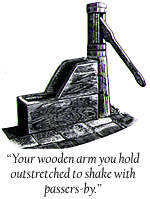Main Menu · Search ·Current Issue ·Contact ·Archives ·Centennial ·Letters to the Editor ·FAQs


Preserved in the University Archives are thousands of the examinations--entrance, hourly, midterm, final, makeup--inflicted on Harvard students over the years. Had you been enrolled in 1898, the takeoff point for this centennial issue, your finals could have included such questions as these:
ANTHROPOLOGY 1. Discuss the problem of the time and place of origin of the human race.
CHEMISTRY 6. Explain the independent migration of the ions. What is the meaning of Hittorf's term Ueberführungszahlen? What is the relation of the amount of migrating material in electrolysis to that actually deposited on the electrode?
CLASSICAL PHILOLOGY 28. Explain the origin of the gerund.
ECONOMICS 1. Many people regard the luxury of the rich as being on the whole a means of preventing harm to the poor. They regard free expenditure of the capitalists' money as a gain to laborers, and its saving as a loss. Is this sound?
ECONOMICS 4. Upon what facts rests the assertion that "the fulcrum of the world's balance of power has shifted from the West to the East, from the Mediterranean to the Pacific"?
ENGINEERING 6c. Why is the pollution of streams by a sewerage system to be discountenanced? What is meant by ventilating and flushing a sewer, and how is it sometimes done?
ENGLISH A. Tell any one of the "Jungle Stories."
ENGLISH 2. Interpret, discuss, supply information as the case may require. Answers should be full and precise. Vague paraphrases are not acceptable. 1. For a silken point I'll give my barony. 2. It hath it original from much grief. 3. Pregnancy is made a tapster. 4. Draw anew the model, in fewer offices. 5. The German hunting in water work. 6. In diet, in affections of delight, in military rules, humors of blood. 7. Here will be old utis. 8. With two points on your shoulder? Much! 9. Here's goodly stuff toward.
ENGLISH 8. What does Matthew Arnold mean by Philistinism? by culture? by Hebraism and Hellenism? Is Philistinism found in America?
FINE ARTS 3. Sketch briefly the course of events at Athens from 500 B.C. to the battle of Chaeronea, with reference to their effect upon the arts.
GEOLOGY 8. For what did the original Diluvian theory stand?
GERMANIC PHILOLOGY 12. In which Germanic language has Umlaut gained the least ground?
GOVERNMENT 14. In a State which prohibits and punishes the sale of cigarettes, A is convicted of selling, in the original package, cigarettes which were imported from Turkey and others brought in from Virginia. The validity of this law is sustained in the Supreme Court of the State. On error in the Supreme Court of the United States, what should be the decision? Why?
HISTORY 12. Contrast the Kulturkampf in Germany with that in France.
HISTORY 14. Does the Monroe Doctrine apply to the question of constructing a trans-isthmian canal?
ITALIAN 4. Why was St. Bernard selected as the last guide of Dante? Discuss the permanent and always contemporary sources of interest in The Divine Comedy. Write from memory twenty or more verses.
LATIN 10. What can you say of Roman means of correspondence? Of Roman commerce? Of Roman superstitions? Of Roman religion? Of Roman brass bands? Of Roman machinery of trade? Of gladiators?
MATHEMATICS 2. A man and a parachute weigh 150 pounds. How large must the parachute be that the man may trust himself to it at any height, if 25 feet a second is a safe velocity with which to reach the ground, given that the resistance of the air is the square of the velocity and is equal to 2 pounds per square foot of opposing surface for a velocity of 30 feet a second.
MILITARY AND NAVAL SCIENCE 1. What can be said of the employment of cavalry against infantry in a battle? How is a pontoon bridge constructed? What do you regard as the principal requisite to our success in the next war?
MUSIC 3. Name the composers of the following works, and the branch of music to which each work belongs: Titus; The Winter Journey; Richard the Lionhearted; The Trojans; Walpurgis Night; Roland; Tod Jesu; B minor Mass; Tancredi; Jessonda; Rosamunde.
PHILOSOPHY 2. Discuss the popular view that psychical facts are in time but not in space.
PHILOSOPHY 5. Discuss the authorship and significance of the following phrases: "Aristocracy of talent"; "The true veins of wealth are purple"; "Character is the parent of comfort."
PHYSICS B. Tell what you can about "saturated vapors."
ZOOLOGY 1. Give the best evidence you can against the view that the animal kingdom has always consisted of the same species as we find in it to-day.
*
Time's up. Sorry, no more writing. Please hand in your examination booklet at the front of the room.
~Primus IV